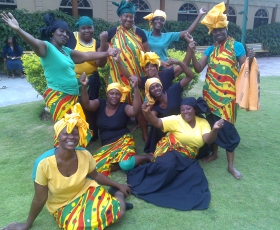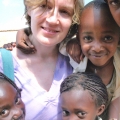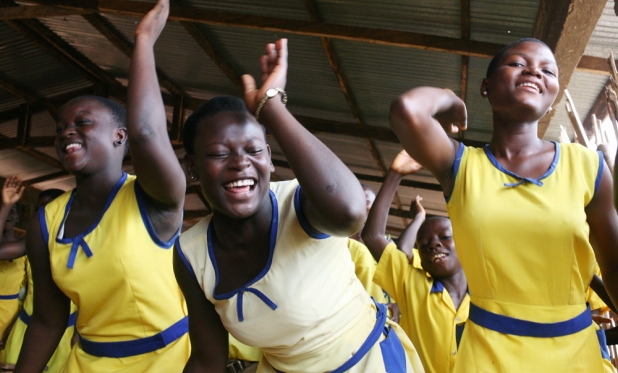Hannah was a senior manager in forensic services when she approached AfID on the recommendation of her sister, a previous AfID volunteer. She was a self-confessed adventurer, with a strong academic background, who wanted to use her ACA qualification and vast experience to contribute to a worthy cause.
Since qualifying as an accountant, Hannah had always known she wanted to work overseas in a charity environment. However, she had reservations about the realism of doing it compared to the idealism of how it sounded. She also realised that trying to break into the charity sector without previous experience was not an easy task.
In September 2010, Hannah took her first steps towards solving both of her reservations. She had decided upon her assignment with AfID - three weeks at
Ahazaza Independent School in Rwanda - and was all set for take-off!
Hannah’s first volunteer experience had such a big impact on her that she returned to AfID in February 2012 to partake in her second assignment. This time Hannah flew to Cambodia, where she spent three weeks at
Epic Arts, a disability Arts Charity that promotes integration and empowerment.
After returning from her second assignment, Hannah knew for sure that she wanted to work full-time in the charity sector. With the help of AfID, she successfully applied for the finance director position at
Theatre for a Change in Malawi, a Non-Government Organisation which promotes knowledge and empowers individuals to reduce the risk of HIV infection and uphold their human rights.
We caught up with Hannah to see how she felt volunteering helped her make that step into the international development sector.
Q. Why did you choose to work in the International Development sector? Did you find it difficult to break into the sector?
Inevitably there was the element that international development sounded exciting; you get to travel the world doing 'good work' and that sounds far sexier than telling people you for work an accounting firm! However, ultimately, I was driven by curiosity and a desire to better understand the world and my place in it.
I found it more difficult than I expected to break into the international development sector as most employers want you to have some experience and to prove that you're serious about working in the sector. My placements with AFID helped, as did previous trustee roles in UK charities.
Q. Who are you working for and where does your job take you?
I work for a fantastic NGO called 'Theatre for a Change', which focuses on improving the sexual and reproductive health (particularly HIV and AIDS prevention) of vulnerable and marginalised groups. I'm based in Malawi’s capital, Lilongwe, but take occasional trips to local villages and primary schools to see our work in action.
Q. Can you tell us a little about your current role and how it differs to your last full time position in your previous sector?
I'm the Finance Director of the Malawian organisation. My role involves managing a team of five finance and admin staff, ensuring donor funds are spent properly, preparing donor reports, budgeting, writing policies, signing cheques, running the office - basically everything and anything that can loosely be called admin or finance!
The role is completely different to anything I’ve ever done before. Even where things are ostensibly similar, the context means a different approach is required; and donors are far more demanding than clients!
Q. What would you say are the pros & cons of your decision to work in the ID sector?
The cons would be slow internet, frequent power cuts and inefficient systems in the country, which make the job frustrating as you can't be as productive as you think you should be. It can also be hard to make decisions when you don't fully understand the context.
On the social side, being so far away from family and friends makes it difficult. In addition, being part of a transient ex-pat community, where new friends often leave just as you're getting to know them, is a negative aspect of the job.
However, for me this is outweighed by the satisfaction of being able to see how you've made a difference to peoples’ lives. I’m fascinated to learn about a new culture and their way of living and working. I still haven't decided whether I’ll stay in this sector or simply view this experience as an interesting interlude, but whatever happens I’ve learnt a lot and followed my dream, which is something I’ll never regret!
Q. Have you found any specific experience from your commercial roles particularly transferable?
I found my Excel and analysis skills particularly important, as well as the ability to think through a problem from first principals.
My old job as a forensic accountant involved going into lots of different situations and businesses, and having to learn quickly what was going on. This taught me to listen first and not assume you have all the answers, which has also been a useful tactic in my current role.
Q. What would be your advice to other accountants considering a similar career change or looking to break into the sector?
My advice is to go for it! You'll learn a lot and change your perspective of the world even if you decide not to stay in the sector in the long term. So, what have you got to lose?
If you have any questions for Hannah, email AfID on info@afid.org.uk and we'll pass it on to her!

 Name
Name

